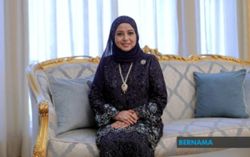
The Music Talent Development programme offers personal tutoring with musicians so students get first-hand exposure into not just instrumentation, but the professionalism it takes to perform in an orchestra. — Photos: ONG SOON HIN/The Star
FOR double bassist Dahlia Dayana Ahmad Nazir, 30, music has been part of her life for as long as she can remember.
She started playing the piano at age four, but didn’t quite like the instrument. Both her musician parents – her father was in the DBKL Pop Orchestra and her mother, a saxophonist – wanted Dahlia Dayana to find a musical instrument she would enjoy playing.
Uh-oh! Daily quota reached.










































